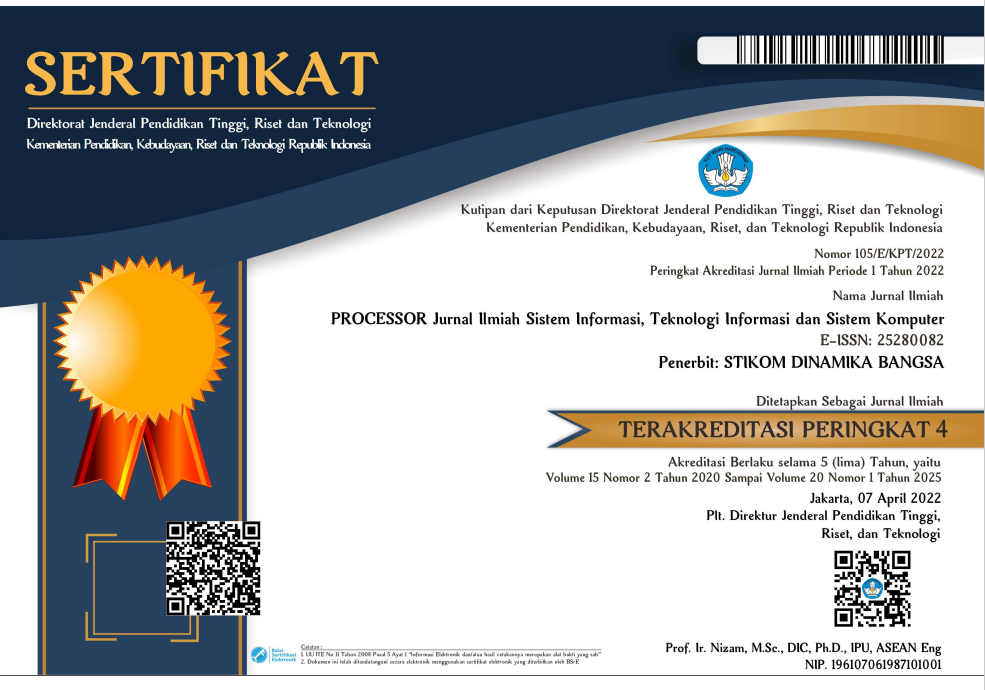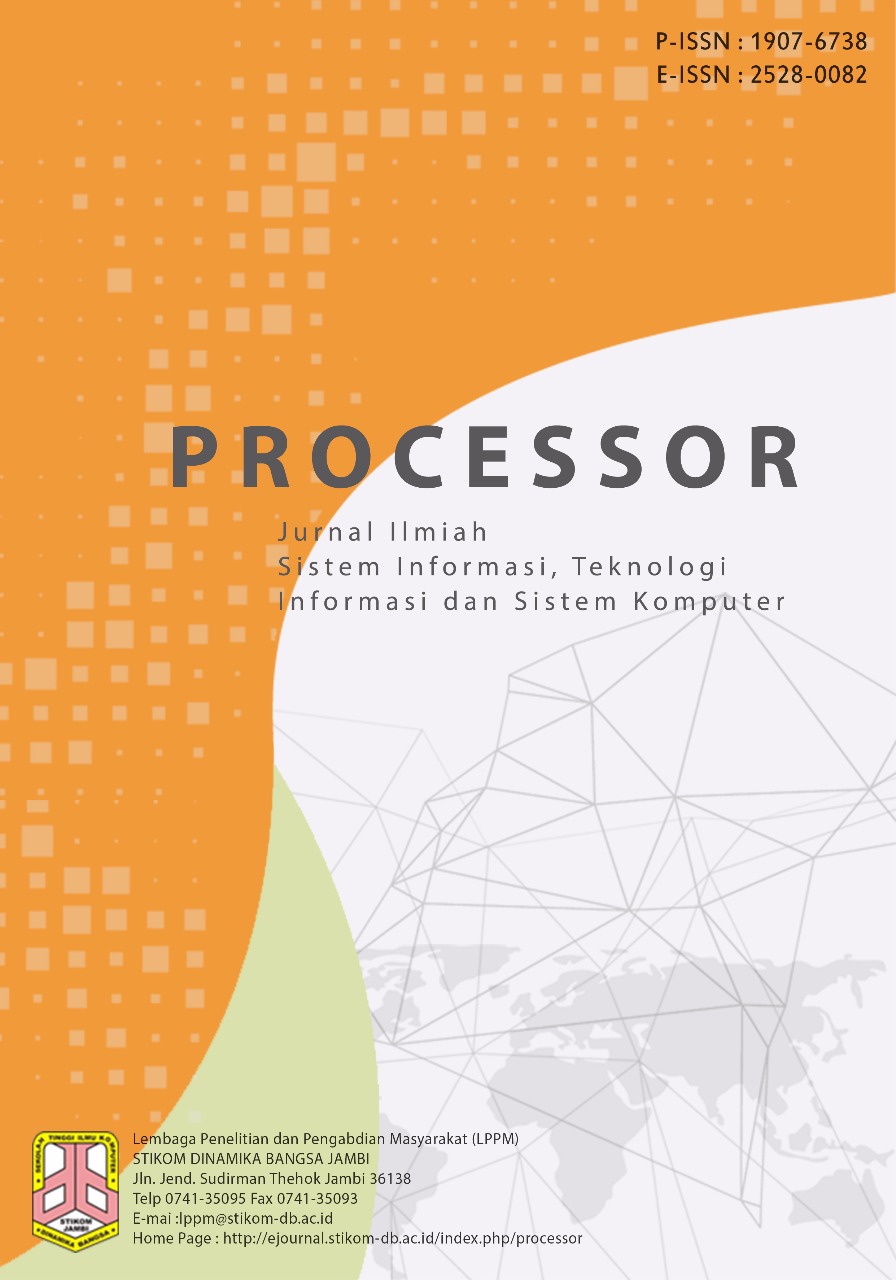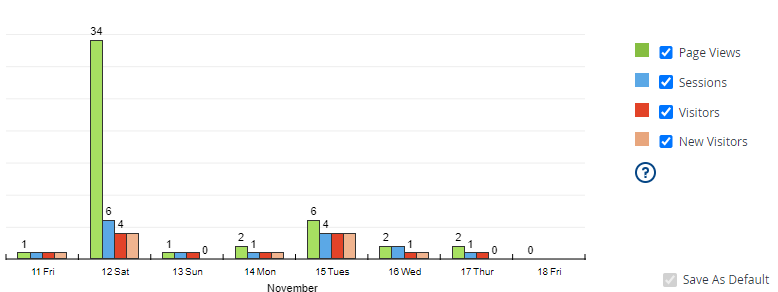Sentiment Analysis of Student Comments Against Course Lecturers in the SIMAT Application
DOI:
https://doi.org/10.33998/processor.2023.18.2.1447Keywords:
Student Comments, SIMAT, Sentiment Analysis, NLPAbstract
Assessment in the form of multiple choices is very easy to do, but not for assessment in the form of descriptions or sentences. In the SIMAT application at the University of Madura, there is a feature for student comments on course lecturers in the form of sentences. Students fill in comments at the end of each semester. Until now, the results of the assessment of student comments have never been given. Sentiment Analysis is one of the techniques in the field of Natural Language Processing (NLP) that studies attitudes, feelings, judgments and people's emotions about something. By using Sentiment Analysis on student comments, it can quickly provide results whether the accumulated student ratings are positive, negative or neutral. This research has succeeded in giving sentiment analysis values to student comments and displaying them in graphical and wordcloud form. From the trial data for 1 course with 21 students who filled in comments, the resulting sentiment analysis value was positive 12, neutral 9, and negative 0 with a value of accuracy, precision, recall and f1 score of 100%.
Downloads
References
M. Ariandi and S. Rahma Puteri, “Analisis Visualisasi Data Kecamatan Kertapati menggunakan Tableau Public,” JUPITER (Jurnal Penelit. Ilmu dan Tek. Komputer), vol. 14, no. 2-b, pp. 366–373, 2022.
A. W. Syahroni and H. Harsono, “Aplikasi Penentuan Kategori dan Fungsi Sintaksis Kalimat Bahasa Indonesia,” InfoTekJar (Jurnal Nas. Inform. dan Teknol. Jaringan), vol. 4, no. 1, pp. 12–20, 2019.
Z. Munawar, Iswanto, D. Widhiantoro, and N. I. Putri, “Analisis Sentimen Covid-19 Pada Media Sosial Dengan Model Neural Machine Translation,” Tematik, vol. 9, no. 1, pp. 15–20, 2022.
M. P. Munthe, A. S. R. Ansori, and ..., “Analisis Sentimen Komentar Pada Saluran Youtube Food Vlogger Berbahasa Indonesia Menggunakan Algoritma Naïve Bayes,” eProceedings Eng., vol. 8, no. 6, pp. 11909–11916, 2021.
I. G. S. Mas Diyasa, N. M. I. Marini Mandenni, M. I. Fachrurrozi, S. I. Pradika, K. R. Nur Manab, and N. R. Sasmita, “Twitter Sentiment Analysis as an Evaluation and Service Base On Python Textblob,” IOP Conf. Ser. Mater. Sci. Eng., vol. 1125, no. 1, p. 012034, 2021.
S. Khairunnisa, A. Adiwijaya, and S. Al Faraby, “Pengaruh Text Preprocessing terhadap Analisis Sentimen Komentar Masyarakat pada Media Sosial Twitter (Studi Kasus Pandemi COVID-19),” J. Media Inform. Budidarma, vol. 5, no. 2, p. 406, 2021.
D. F. Zhafira, B. Rahayudi, and I. Indriati, “Analisis Sentimen Kebijakan Kampus Merdeka Menggunakan Naive Bayes dan Pembobotan TF-IDF Berdasarkan Komentar pada Youtube,” J. Sist. Informasi, Teknol. Informasi, dan Edukasi Sist. Inf., vol. 2, no. 1, pp. 55–63, 2021.
P. GUJJAR J and D. P. Kumar H R, “Sentiment Analysis for running text in Email conversation,” Int. J. Comput. Sci. Eng., vol. 9, no. 4, pp. 259–263, 2020.
R. Wati and S. Ernawati, “Analisis Sentimen Persepsi Publik Mengenai PPKM Pada Twitter Berbasis SVM Menggunakan Python,” J. Tek. Inform. UNIKA St. Thomas, vol. 06, pp. 240–247, 2021.
D. Avelino, L. Cancerlon, M. K. Ryanta, Y. H. Christianto, and W. Wangnardy, “Penggunaan Bahasa Pemrograman Python dalam Menganalisis Perbedaan Desain Website Tren di Negara Jepang dan Dunia,” Angew. Chemie Int. Ed. 6(11), 951–952., vol. 3, no. Mi, pp. 5–24, 1967.
A. P. Praveen Gujjar and H. R. Prasanna Kumar, “Sentiment Analysis:Textblob For Decision Making,” Int. J. Sci. Res. Eng. Trends, vol. 7, no. 2, pp. 2395–566, 2021.
D. Darwis, N. Siskawati, and Z. Abidin, “Penerapan Algoritma Naive Bayes Untuk Analisis Sentimen Review Data Twitter Bmkg Nasional,” J. Tekno Kompak, vol. 15, no. 1, p. 131, 2021.
P. Yoga Saputra, D. Hanifudin Subhi, and Z. Zain Afif Winatama, “Implementasi Sentimen Analisis Komentar Channel Video Pelayanan Pemerintah Di Youtube Menggunakan Algoritma Naïve Bayes,” J. Inform. Polinema, vol. 5, no. 3, pp. 209–213, 2019.
R. P. Sidiq, B. A. Dermawan, and Y. Umaidah, “Sentimen Analisis Komentar Toxic pada Grup Facebook Game Online Menggunakan Klasifikasi Naïve Bayes,” J. Inform. Univ. Pamulang, vol. 5, no. 3, p. 356, 2020.























